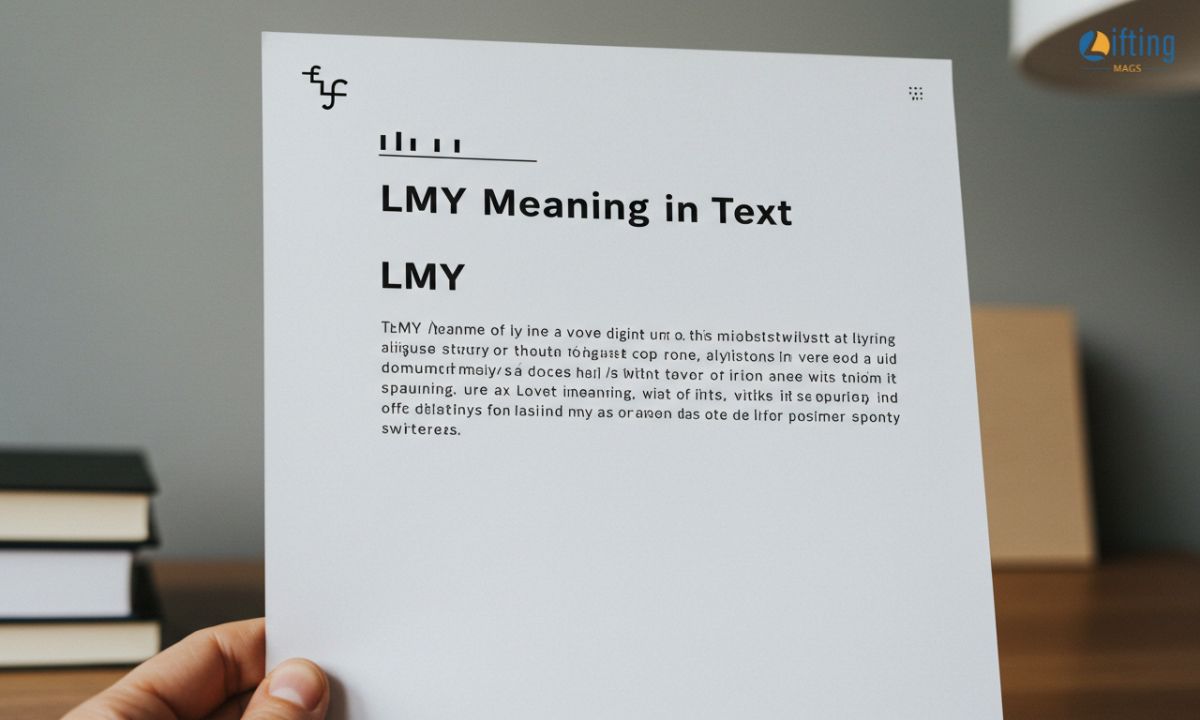In today’s fast-paced digital world, understanding slang and abbreviations is essential for smooth communication. One such abbreviation that you may have come across is LMY. If you’ve ever received a message saying “LMY” and wondered what it means, you’re not alone! This comprehensive guide will help you decode LMY, its various uses, and everything you need to know about this playful expression.
1. Definition & Meaning
LMY most commonly stands for “Love You More.” This phrase is often used as a sweet response to someone saying “ILY” (I Love You), adding a layer of affection and playfulness to conversations.
What Makes LMY Special?
The charm of LMY lies in its brevity and warmth. In a world where communication happens at lightning speed, abbreviations like LMY allow us to express deep feelings without typing out long phrases. It serves as a casual, affectionate acknowledgment, making it ideal for friends, partners, and family alike.
2. Examples in Conversations
Here are some relatable examples of how LMY can be used in everyday conversations:
Casual Conversations
- Friend 1: “Thanks for always being there for me! ILY!”
- Friend 2: “LMY! 💖”
Romantic Contexts
- Partner 1: “You mean the world to me. ILY!”
- Partner 2: “LMY, babe! Can’t wait to see you!”
Family Interactions
- Sibling 1: “ILY for being the best brother!”
- Sibling 2: “LMY! Always got your back! 😊”
These examples illustrate how LMY can foster connection and express affection in various relationships.
3. Background & History
The Evolution of Texting Language
The origins of abbreviations like LMY can be traced back to the rise of SMS texting in the early 2000s. As people began to communicate more through mobile devices, the need for quick, efficient language became apparent. Abbreviations like “LOL” (Laugh Out Loud) and “BRB” (Be Right Back) emerged as shorthand for common expressions.
Timeline of Popularity
- Early 2000s: The introduction of SMS texting popularized shorthand phrases among teens and young adults.
- 2010s: The rise of social media platforms like Facebook and Twitter further ingrained abbreviations into digital communication.
- Present Day: LMY has become a common term in texting, social media, and even dating apps, reflecting a broader trend towards informal and affectionate communication.
Cultural Impact
The widespread use of LMY highlights a cultural shift towards casual, emotionally expressive language in digital communication. This trend is particularly notable among younger generations who value authenticity and connection in their interactions.
4. Usage in Different Contexts
4.1 Texting & Social Media
In texting and social media, LMY is often used between close friends or partners as a sweet reply. Here are some best practices for effectively using LMY:
- Use it with close connections: LMY is best suited for informal relationships.
- Match the tone: Ensure that your use of LMY aligns with the emotional tone of the conversation.
- Avoid overuse: While LMY is endearing, using it too frequently can dilute its meaning.
4.2 Gaming
In the gaming world, LMY can be used jokingly among teammates or online friends. Here’s an example:
- Teammate 1: “Thanks for the revive! ILY!”
- Teammate 2: “LMY, noob 😂”
In this context, LMY adds a layer of camaraderie and humor, making it a light-hearted addition to the conversation.
4.3 Professional Settings
While LMY is a fun and affectionate term, it’s crucial to know when to avoid it. Here are some key points:
- Avoid in professional settings: LMY is considered too informal for workplace communication. Using it in a business context could lead to misunderstandings or come off as unprofessional.
- Alternatives for professional communication: If you find yourself needing to express appreciation or acknowledgment in a work setting, opt for phrases like “Thank you!” or “I appreciate your help.”
5. Common Misconceptions
Myth vs. Truth
Let’s address some common misconceptions surrounding LMY:
- Myth: “LMY always means ‘Let Me You’ (a typo).”
- Truth: Most often, it means “Love You More.”
- Myth: “It’s only for romantic relationships.”
- Truth: Friends and family use it too! LMY is versatile and can be applied in various types of relationships.
Real-Life Scenarios
Consider these scenarios to clarify misconceptions:
- A parent might text “LMY!” to their child after a heartfelt exchange, showcasing its use beyond romance.
- Friends might use it playfully after a supportive conversation, reinforcing the notion that LMY is suitable for platonic relationships too.
6. Similar Terms & Alternatives
Understanding similar terms can enhance your texting vocabulary. Here’s a list of abbreviations that convey similar sentiments:
| Term | Meaning | Best Used For |
|---|---|---|
| ILY | I Love You | All relationships |
| LYSM | Love You So Much | Close friends, partners |
| LMK | Let Me Know | Professional/casual settings |
When to Use Each Term
- ILY: Ideal for all types of relationships when expressing love.
- LYSM: Best for close friends and partners to add a bit more emphasis.
- LMK: Use in professional or casual settings when you want to express a request for information.
7. How to Respond to LMY
Receiving an LMY can be heartwarming, and knowing how to respond appropriately can enhance the interaction:
Casual Responses
- “No, LMY! 😆”
- “You’re the best! LMY too!”
Funny Replies
- “Prove it. Pizza first. 🍕”
- “Only if you bring dessert! 😜”
Professional Context
If LMY appears mistakenly in a work-related chat, a suitable response could be:
- “Thanks! Let’s catch up soon.” (If it was a typo for LMK)
8. Regional & Cultural Differences
Variations Across Cultures
The meaning and usage of LMY can differ based on cultural context.
- US/UK: In both regions, LMY primarily means “Love You More.”
- Other Languages: Similar expressions exist in other languages, such as:
- Spanish: TQM, which stands for “Te Quiero Más” (I love you more).
These variations highlight how affection can be expressed differently across cultures while maintaining a similar underlying sentiment.
9. Is LMY Ever Offensive?
Generally, LMY is not considered offensive, but context matters. Here’s what to keep in mind:
- Tone and Relationship: If someone isn’t close to you, they might find using LMY too forward.
- Situational Examples:
- Using LMY with a new acquaintance could be seen as overly familiar.
- Conversely, using it with a close friend or partner is typically welcomed and appreciated.
10. FAQs
1. Does LMY mean “Let Me You”?
Rarely. It’s usually understood as “Love You More.” If you encounter it as a typo, context will often clarify its meaning.
2. Can I use LMY with my boss?
No! It’s best to stick to more formal language in professional settings. Use “LMK” instead if you want to request information.
3. Is LMY flirty?
It can be, depending on the relationship. In romantic contexts, LMY adds a flirtatious touch, while in platonic relationships, it remains friendly.
Conclusion
Now you know that LMY usually means “Love You More”—a cute, quick way to reply to “ILY.” This expression embodies warmth and affection, making conversations more engaging. Just remember:
- Use it with friends, family, or partners.
- Avoid it in professional chats.
- Always double-check if it might be a typo for LMK.
Understanding the nuances of LMY enhances your digital communication and helps foster deeper connections with those around you. So, the next time you send or receive an LMY, you’ll know exactly what it means and how to respond appropriately!
Call to Action
Explore more about texting slang and digital communication trends. Share this guide on social media to help others understand LMY, and feel free to drop your experiences or questions about LMY in the comments below!

